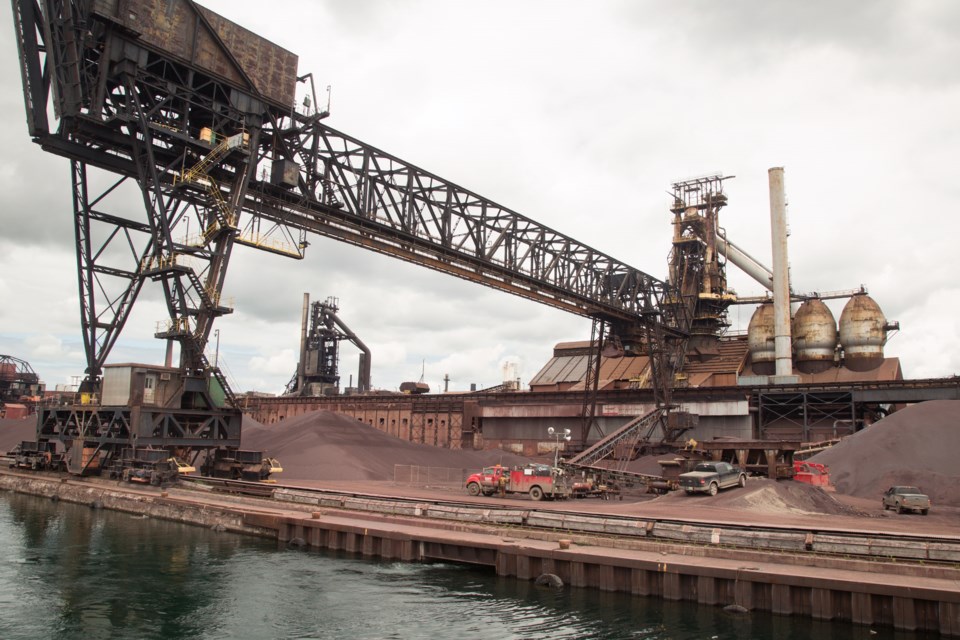Anyone with direct knowledge of the bidding processes for Essar Steel Algoma and U.S. Steel Canada has signed a nondisclosure agreement and isn't supposed to be leaking details to financial reporters.
Word nonetheless recently got to The Globe and Mail and Hamilton Spectator that KPS Capital Partners LP, a New York-based private equity fund, was bidding for both steel companies, raising the prospect of a merger of Canadian steelmaking operations in the Sault, Hamilton and Nanticoke.
On Friday, Essar Algoma President and CEO Kalyan Ghosh made it official, at least so far as his company is concerned.
Essar Steel Algoma had accepted a conditional purchase offer from KPS, backed by the same consortium of lenders that provided the US$200 million debtor-in-possession financing on which the Sault steelmaker has operated since last November.
Among other things, the KPS deal is conditional on reaching agreement with the United Steelworkers (USW) on pension plans and a collective agreement.
Da Prat: 'We’re totally dissatisfied'
But at the Albert Street headquarters of USW Local 2251, Mike Da Prat is not a happy camper.
He's president of Essar Algoma's biggest union.
Under the court-ordered sales and investment solicitation process, he's supposed to be in the loop.
He's not.
The Steelworkers are so far out of the loop, Da Prat says, that when news of the KPS deal broke yesterday, he learned about it on SooToday.
"We’re totally dissatisfied with the process," Da Prat says.
"We were supposed to be one of the consultation parties. We aren't being consulted at all."
'Not actions of company that’s looking to restructure with help of the union'
Anything that Da Prat has been told, he can't repeat because he's signed a nondisclosure agreement.
He's had quite enough of that, thank you.
"As far as I’m concerned, these are not the actions of a company that’s looking to restructure with the help of the union," he says.
"The report seems to suggest that KPS wants a new collective agreement that could very well be problematic."
"We were supposed to have an important seat at the table. We were supposed to be a consultation party."
"We’re going to continue to meet with bidders," Da Prat tells SooToday.
But the muzzle has to go.
"We’re not talking with anyone about contract issues unless we are released from the nondisclosure agreement and we can consult with our members on the issues that are being discussed."
KPS: the friendly barbarian
Under other circumstances, being acquired by a private equity firm might raise concerns about asset-stripping and job-cutting.
But KPS seems to be cast from decidedly better metal.
In a 2009 article, the Financial Times described KPS cofounder and managing partner Michael Psaros as a "friendly barbarian" and "union-friendly vulture investor" who "likes to rescue troubled companies while working with unions to protect jobs."
"Such is his reputation that some unions now call KPS when a company is in trouble," the Times reported. "He credits union links for generating a quarter of KPS’s deals."
Lessons from Leo Gerard
Psaros, it seems, has a special affinity for steel towns.
An article published two years ago in the Pittsburgh Post-Gazette tells how, when Psaros was a high school junior in 1983, his family gathered around a radio in the kitchen of their home in Weirton, West Virginia, anxiously awaiting news about the future of Weirton Steel, where his father and grandfather worked.
"The employee buyout inspired him to pursue a career based on the bold premise of the Weirton experiment," the Post-Gazette wrote.
"It inspired me to do what we're doing today," Psaros told the newspaper's Len Boselovic.
"In most situations, capital and labor are anathema to one another. We see the power in capital and labor working together with one another."
Leo Gerard, the legendary Sudbury Steelworker who became president of the international union and a vice-president of the AFL-CIO, joked that Psaros owes a lot of his business savvy to his Steelworker dealings.
"We had to teach both Psaros and [KPS cofounder David] Shapiro how to actually do real negotiations. They learned that through the union," Gerard told the Post-Gazette.
158 proposals
The collective agreement between Essar Algoma and Local 2251 expires on July 31.
Da Prat has previously told SooToday that the contract will be extended only if both parties agree to the extension.
In the meantime, if he can get released from any nondisclosure agreement, he's ready to bargain.
"We have prepared 158 proposals for contract negotiations in any set of negotiations," he told SooToday last night.
